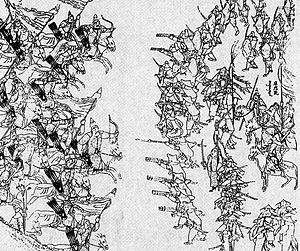Battle of Sarhu
| Battle of Sarhu | |||||||
|---|---|---|---|---|---|---|---|
| Part of the Qing conquest of the Ming | |||||||
 The Jurchen cavalry charging Ming infantry in the battle of Sarhu. |
|||||||
|
|||||||
| Belligerents | |||||||
| Later Jin |
Ming dynasty Joseon |
||||||
| Commanders and leaders | |||||||
|
Nurhaci Hong Taiji Daišan Laimbu |
Ming: Du Song † Liu Ting † Ma Lin Li Rubai Joseon: Gang Hong-rip |
||||||
| Strength | |||||||
| 60,000 | Ming: 90,000-120,000 Joseon: 13,000 |
||||||
| Casualties and losses | |||||||
| 2,000-5,000 | 45,000 300 officers 28,000 horses |
||||||
The Battle of Sarhū (薩爾滸之戰, Sà'ěrhǔ zhī zhàn) refers to a series of battles between the Later Jin dynasty (later known as the Qing dynasty) and the Ming dynasty and their Joseon allies in the winter of 1619. The battle is notable for the heavy use of cavalry by the Later Jin in defeating Ming and Joseon forces equipped with hand cannons, cannons, and matchlocks.
Prior to the battle Nurhaci had unified the Jurchen people, excluding the Yehe, and took a hostile attitude towards the Ming for favoritism and meddling in the affairs of the Jurchen tribes. In 1618, he proclaimed his Seven Grievances (nadan amba koro 七大恨) with the Ming to Heaven and subsequently declared war. He occupied Fushun, Qinghe (清河) and other cities before retreating. The death of the Ming Vice-General Zhang Chengyin (張承蔭) stunned the Ming court. In 1619, he attacked the Yehe (葉赫) in an attempt to provoke Ming. Ming responded by dispatching expeditionary forces led by Military Commissioner Yang Hao to besiege Hetu Ala from four routes.
Du Song's forces set off west from Shenyang on the night of the 29th of the 2nd lunar month under torchlight. He had orders to arrive at Yagu Gate on the 2nd of the 3rd lunar month, so he arrived the next day at Fushun, 100 li (里) away, and captured the undefended city. Du's army was delayed by snow and stayed at Fushun for some time, but Du grew impatient and set forth with his army after 10 days despite the unfavorable conditions.
When they arrived at the Hun River, the Jin had already set up defenses on the other side of the river. Du Song was advised to camp for the night, but he refused and took 10,000 men with him across the river to attack Jin defenses, while leaving 20,000 with the artillery train and baggage on the other side. One source accuses him of drunkenness having clouded his judgment that night. He was asked to wear armor prior to the crossing, but he replied that being in the military for this many years, he did not know how heavy armor was as he never wore it, and crossed the river. When his forces were half way across, Nurhaci ordered his bannermen to break the dams they had prepared and Du's men had to abandon their equipment to escape the current. The commander in charge of artillery and baggage was supposed to coordinate the crossing following Du, but he refused due to the river's turbulence.
...
Wikipedia
